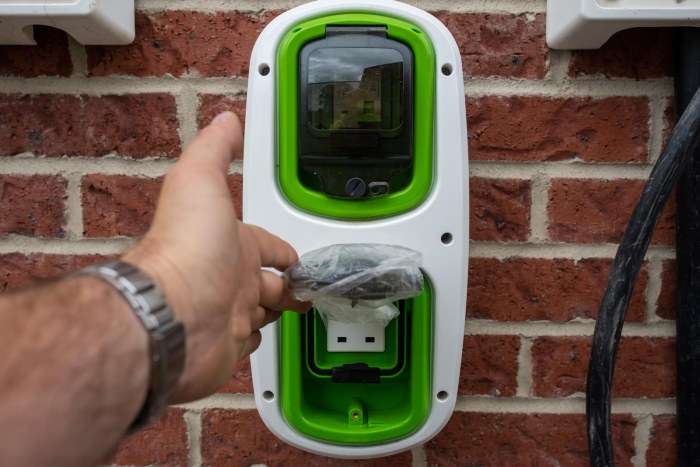While the figures differ, the answer to the question, ‘Does an EV charger add value to your house?’, is ‘Probably’.
There are several reasons why an electrical vehicle (EV) charger boosts a home’s value, and it comes down to these issues:
- After 2030, people will no longer be able to buy a car with a combustion engine
- Growing numbers of drivers are already switching to electric vehicles
- Demand for homes with an electric vehicle charging point is rising.
And the government has already made clear that from next year there will be a legal requirement for property developers to install electric vehicle charging stations.
These new rules also extend to any building that undergoes a ‘major renovation’ and these too will need an EV charging point.
But does this mean that splashing out on an EV charge point is worth the money?
Does an electric car charger increase house value?
One car leasing firm looked at the question, ‘Does an electrical car charger increase house value?’ and they came up with a startling answer.
That’s because Rivervale Leasing analysed 1,000 home values and found that 76% of those that have an EV charger have a higher value than the local average.
But that’s an average – it’s not quite the same figure around the country.
For example, homeowners in Swindon who have an EV home charger installed will see an impressive increase to their property’s value of 84%, compared with average house prices in the city.
According to the research, a home in Swindon with an EV charger will cost £455,000 on average, while a house without one will cost £247,441. That’s an impressive difference of £207,559!
However, it’s worth keeping in mind that people with EVs are more likely to have higher value properties anyway and so we obviously cannot attribute the entire difference simple to installing an EV charger.
Elsewhere, the difference is:
- Walsall: 75%
- Birkenhead: 55%
- Ipswich: 54%.
It’s not all good news, however, with homeowners in some areas seeing their home’s value being negatively impacted, including:
- City of Westminster: – 38%
- Wigan: -24%
- Glasgow: -23%
- Bexley: -19%.
How much does an EV charger increase home value?
The car leasing firm’s research reveals that a home that has an electric charging point installed will sell for 30% more than the average local house price.
Of course, this doesn’t factor in that more premium properties are more likely to be owned by people who can afford and need to install an EV charger in the first place.
However, it is part of the evidence that EV chargers do add probably value to homes, and at the very least, make them more desirable as the adoption of electric vehicles grows.
That makes the average cost of installing an EV charger which is, according to the RAC, around £800 means they can be a worthwhile investment.
However, a wall box will cost anything between £450 and £1,200 to install and the difference in that cost is the amount of power that it will supply with the cheapest being 3.6kW chargers.
Plus, there’s currently a UK government grant available that will pay up to 75% of the charging point’s cost to a maximum of £350. (This grant is set to end in March 2022 – though will remain open to those living in flats, including rented accommodation).
What is an electric car charger?

Firstly, charging an electric car while parked at your home will be cheaper than filling up with fuel in a diesel or petrol car.
This is also a convenient way to recharge a car’s battery and you’ll need off-road parking, for example, a garage or driveway.
You also need to be able to get power to the charging point location so you can install a wall box for easy charging.
And while you can plug your electric vehicle into a regular plug socket, you’ll find that the charging times are very long.
This means installing or wall box will lead to quicker charging times though you need to be aware of trailing the recharging cables across a pavement because they will create a trip hazard.
Along with a wall box, you can install that stands apart from the front or side of a property.
Selling A Property? FREE Step-By-Step Platform
Where can an electric car charging point be installed?
An electrical car charging point can be installed wherever you can supply electricity to it.
A typical wall charger will deliver power of up to 7.4kW, and there are cheaper chargers available offering 3.6kW – though you’ll take longer to recharge your car’s battery.
You will also need to check with your electricity supplier that it is possible to install a charging point because you will need a three-phase connection.
A three-phase network offers three live wires so you could connect all three of these for a quick power supply.
Most homes in the UK will have access to a three-phase connection, but most will only use a single-phase connection.
There’s a quick and easy way to check which connector you have, and that is to look in the fuse box and if there are three 100-amp fuses, then you have three-phase connection.
If you don’t, you need to speak about upgrading your power supply.
Will my home’s value be boosted by installing a car charger?
Having seen the results of the car leasing firm’s research, it’s worth looking at what a leading property buying group says about installing a charging point and how it affects a home’s value.
The National Association of Property Buyers (NAPB) say that an electric car charging point could add up to £5,000 to your home’s value.
The organisation’s Jonathan Rolande said: “The average charge point will cost around £800, and we are seeing cases where a homeowner is seeing a quick return on their investment.”
He added: “The convenience of a charging point is popular with buyers who own an electric vehicle, or who intend to buy one in the future.”
The NAPB says the trend of boosting a home’s value with an electric car charging point looks set to continue.
The organisation also highlights that the number of properties that are being put up for sale with an EV charging point is now five times higher than it was just 12 months ago.
Mr Rolande said: “At present, more than 40% of homes do not have off-road parking so we need to think about how those in rental accommodation and property owners will charge their vehicles.”
He says that developers could use street lighting as a solution, or builders or councils could add charging points along the street on a pay-as-you-go basis.
The views of the NAPB are underlined by the firm, Simple Fast Mortgage.
The firm’s Rob Peter told one national newspaper that they are seeing more people asking whether a property has an EV charging point installed.
He explained: “A few years ago, if you had an EV charging port when selling a home, it was a gimmick to buyers and may even put some of them off since EVs were less mainstream.
“However, with the standard and availability of electric vehicles improving, and ownership costs coming down, whether a property has an electric vehicle charging port is becoming a commonly asked question by tech-savvy homebuyers.”
Why will home charging points add value to a property?

One of the big issues as electric vehicle ownership increases is the convenience of charging a battery-powered car at home. This means:
- EV drivers can get on with their life without having to visit a rapid charging station
- They don’t have to recharge their EV at work, if there’s charging point installed there.
Also, you’ll find as an EV owner that it’s easier to control the running costs since you will know how much you are paying for your electricity supply and there are special rates for EV charging available from some suppliers since the charging will take place overnight.
Does an EV charger add value to your house?
It does appear that having an EV charger will add value to your house and it’s worth noting that nearly 90,000 searches are being carried out every month by Brits looking to buy or lease an electric car.
This indicates a direction of travel and with 175,000 EVs registered in 2020 means that more people will be interested in driving one.
However, one in five people say they will not switch to an electric vehicle simply because they do not have a charging point located nearby.
The research reveals that for most homeowners with a driveway or a location for a charging point will see an excellent return on their investment but it’s also worth checking beforehand that your charging point will deliver an increase in your property’s value.
Essentially, if you already have an electric car charging point in place at your home, then you will be reassured that your property’s value will continue increasing because it will be a feature that will become increasingly popular with potential buyers.
And, if you are thinking of investing in an EV charging point at your home, even if you don’t have an electric car at this point, it looks like a great investment to make to boost your property’s value and attractiveness to other potential homebuyers.
But there’s no doubt that from 2030 and the banning of combustion engine vehicle sales means that more of us will need to make the switch to EVs and to do that we will need the reassurance of having access to a charging point, preferably at home.





